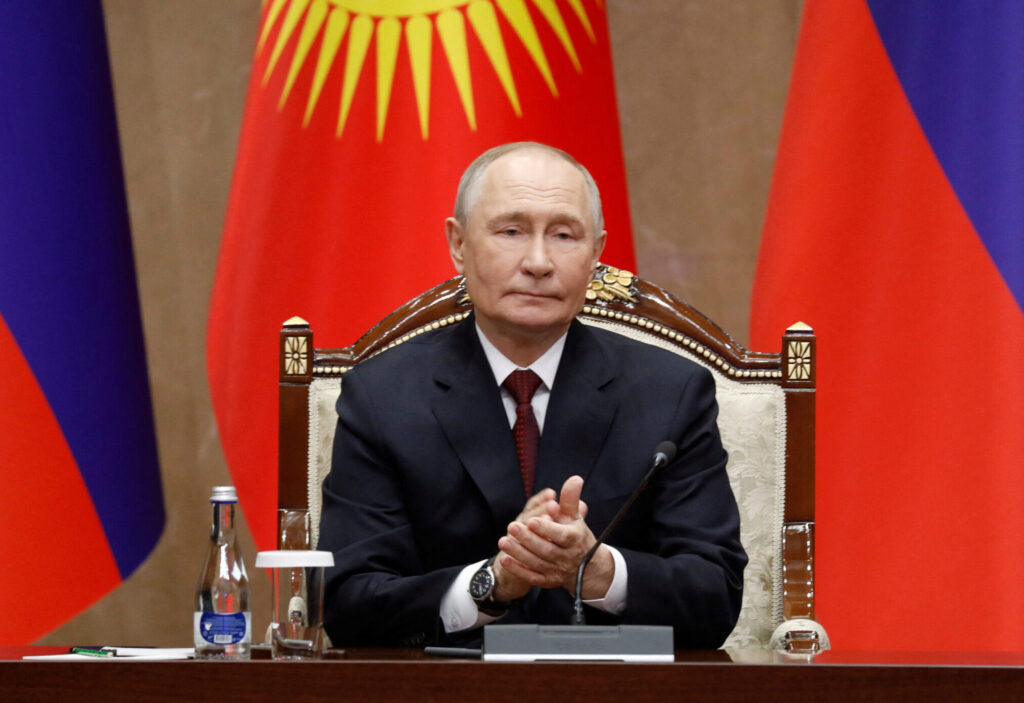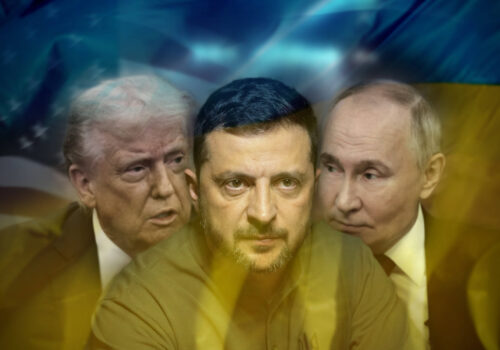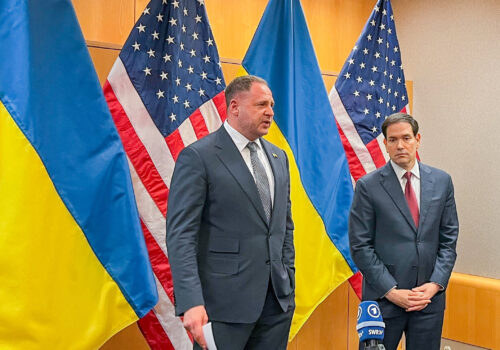US President Donald Trump has this week declared “tremendous progress” toward ending the war between Russia and Ukraine. This upbeat assessment comes following a sudden flurry of diplomatic activity sparked by a 28-point peace proposal that caught almost everyone by surprise, marking a new twist in Trump’s longstanding efforts to broker a peace deal.
Not everyone shares the US leader’s optimistic outlook. Skeptics note that while the United States and Ukraine have now reportedly agreed upon the broad outlines of a future settlement, there is very little to suggest that Russia is similarly interested in peace. On the contrary, the Kremlin has responded to Trump’s latest overtures by ruling out any major concessions and signaling that Moscow remains firmly focused on the maximalist goals of the invasion.
As talks between American, Ukrainian, and Russian officials continue, Russian President Vladimir Putin has underlined his true intentions by issuing a presidential decree calling for an escalation in efforts to eradicate all traces of Ukrainian identity from the approximately 20 percent of Ukraine currently under Kremlin control.
The decree, entitled “Russian National Policy Until 2036,” was published on November 25 and is set to come into force in January 2026, Reuters reports. It calls on the Russian authorities in occupied Ukraine to “adopt additional measures to strengthen overall Russian civic identity.” The policy document also praises the invasion of Ukraine for “creating conditions for restoring the unity of the historical territories of the Russian state.”
This bureaucratic language is an attempt to sanitize the Kremlin’s ongoing campaign to erase Ukrainian national identity. Throughout Russian-occupied regions in the south and east of the country, Moscow has instituted a reign of terror against the civilian population while systematically targeting the symbols of Ukrainian statehood, language, heritage, and culture.
Wherever Russian troops advance, local populations are subjected to large-scale arrests, with anyone deemed a potential threat to the occupation authorities likely to disappear into a vast network of camps and prisons. Victims typically include elected officials, journalists, religious leaders, activists, and military veterans. A UN investigation published in spring 2025 found that these detentions constituted a crime against humanity.
Those who remain are pressured to accept Russian citizenship or face being deprived of access to essentials such as healthcare, pensions, and banking services. In line with Kremlin legislation adopted earlier this year, property owners who refuse Russian passports can be evicted from their homes and deported. Meanwhile, schoolchildren are being taught a heavily militarized Kremlin curriculum that demonizes Ukrainians while praising Russian imperialism and glorifying the invasion of their country. Any parents who resist these policies risk losing custody of their children.
The most notorious element of Moscow’s campaign to extinguish Ukrainian identity is the mass abduction of Ukrainian children. Since the start of the full-scale invasion, around twenty thousand victims are believed to have been taken to Russia and subjected to ideological indoctrination designed to rob them of their Ukrainian heritage and impose a Russian identity. In 2023, the International Criminal Court of The Hague issued an arrest warrant for Vladimir Putin over his personal involvement in these child abductions.
Stay updated
As the world watches the Russian invasion of Ukraine unfold, UkraineAlert delivers the best Atlantic Council expert insight and analysis on Ukraine twice a week directly to your inbox.
Russian policies in occupied Ukraine serve as a chilling blueprint for Putin’s future actions if he is able to establish control over the entire country. Indeed, Russia is already actively seeking to depopulate large parts of Ukraine that remain beyond Moscow’s grasp. In front line areas throughout southern Ukraine, the Russian military has embarked on an unprecedented campaign of targeted drone strikes against the civilian population that has killed hundreds and been branded a “human safari.” A recent United Nations probe concluded that these attacks are war crimes with the goal of making whole towns and cities unlivable.
Likewise, during 2025 Russia has intensified the missile and drone bombardment of Ukraine’s civilian population and the country’s critical infrastructure in an apparent attempt to spark fresh waves of refugees. Due in part to these attacks, Ukrainian civilian casualties rose by 27 percent during the first ten months of the year, according to the United Nations Monitoring Mission in Ukraine.
Putin’s posture during peace talks has raised further fundamental questions over his willingness to coexist with an independent and sovereign Ukraine. Ever since the initial round of negotiations in spring 2022, Russia has consistently demanded the comprehensive demilitarization of Ukraine. This has included calls for strict limits on the size of the Ukrainian army and the categories of weapons the country is allowed to possess, along with a ban on NATO membership or any other form of military cooperation with Western partners.
Russia’s insistence on an internationally isolated and disarmed Ukraine remains at the heart of the current negotiations. This should serve as a massive red flag for anyone who still believes that Putin is ready for peace. The Russian dictator obviously has no intention of abandoning the reconquest of Ukraine and aims to resume the invasion in more favorable circumstances once Ukraine has been stripped of allies and rendered defenseless.
Eurasia Center events

Putin’s determination to continue the invasion of Ukraine should come as no surprise. While Trump sees the current war as a geopolitical real estate deal, Putin believes he is on an historic mission to reverse the Soviet collapse and revive the Russian Empire. This explains his otherwise inexplicable obsession with ending Ukrainian independence, which Putin has come to view as the ultimate symbol of modern Russia’s humiliating fall from grace.
On the eve of the full-scale invasion, Putin called Ukraine “an inalienable part of our own history, culture, and spiritual space.” But his desire to extinguish Ukrainian statehood goes far beyond any toxic feelings of shared kinship. For Putin, the consolidation of a democratic, European Ukraine poses an existential threat to authoritarian Russia that could serve as a catalyst for the next stage in an imperial retreat that begin with the fall of the Berlin Wall. Haunted by the people power uprisings that brought down the USSR, he will do almost anything to prevent a repeat.
Since the Russian invasion of Ukraine first began with the 2014 seizure of Crimea, Putin’s crusade to force Ukraine back into the Kremlin orbit has come to dominate his reign. In pursuit of this goal, he has sacrificed Russia’s relationship with the democratic world, while also doing untold damage to the country’s economic prosperity and international standing. After everything that has happened, he can hardly now accept a peace deal that leaves 80 percent of Ukraine permanently hostile to Russia and firmly embedded in the West. Putin’s propaganda machine is perhaps the most powerful in the world, but even his most skilled media managers would struggle to spin such an outcome as anything other than a disastrous Russian defeat.
Putin’s latest presidential decree demanding further efforts to create a Ukraine without Ukrainians underlines the absurdity of attempts to find any meaningful middle ground between Moscow and Kyiv. With a compromise peace out of the question, Putin’s plan is to keep fighting while hoping to outlast the West and exhaust Ukraine. He will continue to engage in negotiations with the United States as a tactic to stall further sanctions and divide his enemies, but there is virtually zero chance of Russia voluntarily accepting any deal that guarantees the continued existence of a Ukrainian state.
This does not mean that Putin cannot be forced to end his invasion. But it does mean that current efforts to broker a negotiated settlement are doomed to fail. Putin is convinced that in order to correct the historical injustices of the past three decades and safeguard Russia’s place in the world, he must destroy Ukraine as a state and as a nation. It is delusional to think that a man committed to criminality on such a grand scale could be swayed by talk of sanctions relief and minor territorial concessions.
Instead, the objective should be to increase the economic and military pressure on Putin until he begins to fear a new Russian collapse in the tradition of 1917 and 1991. This will require the kind of political courage from Ukraine’s partners that has been in short supply since 2022, but it is the only way to secure a sustainable peace in Europe. Putin dreams of taking his place in Russian history alongside Ivan the Terrible, Peter the Great, and Joseph Stalin, but he most definitely does not want to share the ignominious fate of Czar Nicholas II and Mikhail Gorbachev.
Peter Dickinson is editor of the Atlantic Council’s UkraineAlert service.
Further reading
The views expressed in UkraineAlert are solely those of the authors and do not necessarily reflect the views of the Atlantic Council, its staff, or its supporters.

The Eurasia Center’s mission is to enhance transatlantic cooperation in promoting stability, democratic values, and prosperity in Eurasia, from Eastern Europe and Turkey in the West to the Caucasus, Russia, and Central Asia in the East.
Follow us on social media
and support our work
Image: Russian President Vladimir Putin attends a joint press conference with Kyrgyz President Sadyr Japarov following their meeting in Bishkek, Kyrgyzstan. November 26, 2025. (REUTERS/Vladimir Pirogov)




